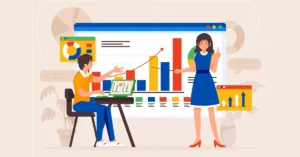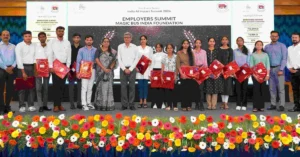Full Stak web development is an evergreen domain in the software development circle. A full-stack web developer with the ability to develop and maintain both the front end and back of a web page or web application is in unprecedented demand the world over. This is largely due to the influx of more and more companies to the internet.
The other reason why full-stack developers are in demand is because of the wide array of tools and libraries available to make development much easier than it was before. You must be wondering what exactly these tools are that could bolster your professional value in the job market. This is precisely what we seek to discuss in this article.
In the below paragraphs, we will list out the technical as well as non-technical skills that will help you master full-stack web development in the shortest amount of time. Further, we will also look into which is the best full stack developer course to find all the necessary training to learn both front-end and back-end web page development.
What is a Full-Stack Developer?
A front-end web developer is someone who can design, build, and optimize the user interface of a webpage or a web application. A back-end developer, on the other hand, is someone who can develop the databases, and servers and make the required connections between the servers and the front end of the application. A full-stack web developer is one who can develop both the front end and back-end of the application and take full ownership of the web development process.
How to become a Full-Stack Developer?
There are myriad ways to become a full-stack developer in today’s world. You can do a full-time computer science degree and pursue a full-stack development career after it. However, this is no more a necessity as there are plenty of online Full Stack Web Developer Bootcamps that will teach programming from scratch and will enable you to use most of the modern web development tools with ease.
Most of these online Bootcamps are well worth the money and time you put into them as they have tie-ups with companies who directly offer placements after the course. Moreover, many of these online courses offer lifetime access to their content, and the content is regularly updated with tutorials of the most advanced web development tools available.
Skills Required to Become a Full-Stack Developer
Let us take a look at the skillset that a Fullstack Web Developer must possess. The best full-stack developer courses will include most, if not all, of the tools listed below.
Front-end Development
1. HTML and CSS
HTML, an acronym for Hypertext markup language, governs the on-screen appearance of text/images on almost every webpage. It formats text as headings, paragraphs, lists, and so on.
CSS (Cascading Style Sheets) HTML language by allowing developers to alter and style different web components for factors such as font, size, spacing, etc. Overall, It makes the content present on the webpage more decorative.
2. JavaScript
Javascript is a powerful client-side programming language used mainly for enhancing user interaction with web applications. Its main advantage is that it offers several libraries and frameworks such as React, Angular, Vue, and JQuery.
Backend Technologies and Frameworks
1. NodeJS and ExpressJS
Node is an open-source, cross-platform runtime environment that lets developers create server-side tools as well as JavaScript applications. A decent knowledge of the basic command line packages like npm (Node Package Manager) is also necessary.
Java, is another effective tool for developing the backend of applications. Popular Java frameworks for web development are Spring and Java Server faces.
Python is another more flexible and easier-to-use language.
Django, a high-level Python web framework, is also commonly used for backend development. It is free and open-source and has a huge and active community of users.
Other languages used for web development include PHP, Perl, and Ruby.
2. Database Management Systems
Typically, a full-stack developer also writes code that helps to perform Relational mapping for fetching data from a database. The most popularly used DBMS tools are MySQL, SQL SERVER, MongoDB, PostgreSQL, and Oracle Database.
3. Version Control
Full-stack developers will also need to incorporate version control systems to manage the project files and also keep track of the entire history of the page. Popular version control tools are Git, Github, and Subversion.
4. Web Hosting Platforms
Web hosting platforms let you deploy your product (website) on a cloud service provider, which will enable us to access it from the World Wide Web. The most popular web hosting sites are Amazon web services, Microsoft Azure, Google cloud platform, and Heroku.
Soft Skills
Apart from technical skills, a full-stack developer needs to possess some basic soft skills such as:
1. Creativity – to understand the project’s objectives and develop a product that engages the target audience.
2. Strategic planning – to plan, design, develop, and implement various phases of web development strategically.
3. Analytical skills – to analyze information accurately and thereby make logical, data-driven decisions to maximize the efficiency of the development process.
4. Problem-solving skills – to predict any errors and develop a bug-free application.
5. Time management skills – to meet deadlines while ensuring proper execution of tasks.
Full Stack Developer Salary Scales
As per PayScale, the average salary of a full-stack developer in the United States is around 75k USD.
On the other hand, In India, the average salary of a full stack developer is around 6 Lakhs INR.
Conclusion
Hopefully, this article has helped you gain better insight into the realm of Full Stack web development. Use the information given here to seek the best full-stack developer course of your liking so that you can start your professional journey in web development without much delay. Finally, no amount of technical knowledge will match real-life experience in the field. So, try to practice your web development skills from all available sources to sharpen them.





